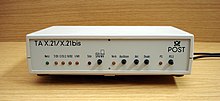Data circuit-terminating equipment


A data circuit-terminating equipment.
In a data station, the DCE performs functions such as
Usage
Although the terms are most commonly used with RS-232, several data communication standards define different types of interfaces between a DCE and a DTE. The DCE is a device that communicates with a DTE device in these standards. Standards that use this nomenclature include:
- Federal Standard 1037C, MIL-STD-188
- RS-232
- Certain V.35)
- Certain ITU-T standards in the X series (notably X.21 and X.25)
A general rule is that DCE devices provide the clock signal (internal clocking) and the DTE device synchronizes on the provided clock (external clocking).
When two devices, that are both DTE or both DCE, must be connected together without a modem or a similar media translator between them, a crossover cable must be used, e.g. a null modem for RS-232 or an Ethernet crossover cable/body
See also
References
- ^ TIA-232-F Interface Between Data Terminal Equipment and Data Circuit-Terminating Equipment Employing Serial Binary Data Interchange. 1997.
- OCLC 38637094.
- ^ )
- ^ MIL-STD-188-100, pg. 24, Fig 4.3-1, 1972.
